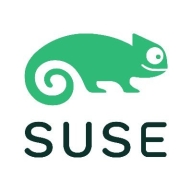

Ubuntu Linux and SUSE Linux Enterprise compete in the robust Linux environments category. Ubuntu commands a stronger presence due to its affordable pricing and extensive community support, whereas SUSE gains favor for its premium functionality and enterprise-grade support.
Features: Ubuntu Linux emphasizes security, speed, and flexibility, appealing to those needing frequent updates and broad software support without reinstallation. SUSE Linux Enterprise attracts with advanced management tools such as YaST, offering substantial support for enterprise applications like SAP.
Room for Improvement: Ubuntu Linux needs better system management tool integration and enhanced support for Microsoft applications. Enhanced desktop environment and documentation are also areas to improve. SUSE Linux Enterprise could benefit from clearer service customization, improved education tools, and a more user-friendly interface.
Ease of Deployment and Customer Service: Ubuntu sees deployment across diverse environments, supported by a strong community. SUSE typically engages businesses seeking formal support structures, combining deployment versatility with professional support, benefiting certain enterprises.
Pricing and ROI: Ubuntu's open-source nature offers low costs and high ROI due to free use and community-driven assistance. SUSE demands higher upfront investment, delivering long-term value through enhanced features and dedicated enterprise support.
I have seen a return on investment by switching our clusters from on-prem to Azure public cloud, using our same Bring Your Own Licenses, which saved costs on licensing.
SUSE Linux Enterprise provides a stable, secure, and well-supported platform for enterprise workloads, with powerful management tools and robust support for clustering, cloud, and containers.
The customer support is good; whenever we have opened a case, they have provided detailed explanations of the issues and resolutions.
I rate the customer service 10 out of 10 because SUSE has 24/7 availability support, extended support, security, multi-Linux distribution support, upgradation, and everything is user-friendly.
They responded well, understood that the issue was not on my end, and provided a patch within two days.
The community around Ubuntu Linux is beneficial, providing answers to questions and assisting with issues.
Ubuntu Linux has a comprehensive knowledge base for self-help.
Its scalability is quite good since we are using Azure, which allows us to easily scale up or down our resources as needed.
SUSE Linux Enterprise is widely recognized for its strong scalability, making it suitable for organizations of all sizes, from small businesses to global enterprises.
In a server environment, it can seamlessly adapt to increased customer demand.
Any Linux is scalable in terms of capacity, and on a day-to-day basis, we use scalability options with the help of Kubernetes clusters.
So far, I do not have any issues related to security in Ubuntu Linux.
When HANA is utilized by many applications, I notice that while utilization does increase, we have never faced lagging or server unresponsiveness.
I would rate stability for SUSE Linux Enterprise an eight out of ten.
The system has been completely stable, which makes it deserve a perfect score.
Ubuntu Linux is extremely stable and maintains uptime effectively.
Ubuntu Linux is generally stable, though there can be occasional issues with new hardware integration.
Security is a top concern, and further strengthening default security policies, simplifying compliance management, and integrating advanced vulnerability management tools would be a valuable improvement.
The software manager was different, making it challenging to install certain applications.
The license we subscribed to should carry over within the same instance family.
There is a push towards integrating AI into software for various purposes like video and sound processing.
Stability issues occur when integrating new components due to physical or technical challenges.
Unlike CentOS, Ubuntu Linux lacks an easily accessible inbuilt repository where dependencies or packages are easily found.
Upgrading an instance results in overlapping or double subscription fees.
I would rate pricing for SUSE Linux Enterprise considering one is a high price and ten is a low price.
The licensing cost is a bit high.
For an enterprise-wide scalable operating system with professional services, you can select Ubuntu Linux at a reasonable price.
The setup cost is free.
Ubuntu Linux is open-source, leading to cost savings through its free availability.
SUSE Linux had a clean user interface, which was a valuable feature for me.
It has a stable and reliable OS.
The LVM is very easy to configure, along with simple disk scanning compared to other systems.
Ubuntu Linux's open-source nature supports community contributions, bolstering its development and support ecosystem.
Ubuntu Linux supports remote troubleshooting via SSH, allowing connection from anywhere, which is beneficial for troubleshooting server issues.
In terms of security, I am satisfied with Ubuntu Linux and I can rely on its security features more than I can with Windows.
| Product | Market Share (%) |
|---|---|
| Ubuntu Linux | 10.1% |
| SUSE Linux Enterprise | 5.8% |
| Other | 84.1% |


| Company Size | Count |
|---|---|
| Small Business | 8 |
| Midsize Enterprise | 11 |
| Large Enterprise | 22 |
| Company Size | Count |
|---|---|
| Small Business | 84 |
| Midsize Enterprise | 21 |
| Large Enterprise | 53 |
SUSE Linux Enterprise offers features like YaST for server management, seamless integration with Oracle and SAP, and a robust security setup. Renowned for stability, it efficiently supports workstations, SAP workloads, and cloud migrations across diverse industries.
SUSE Linux Enterprise is known for its lightweight design, high performance, and ease of installation. Its flexible architecture supports extensive documentation and efficient patching. The system uses the BTRFS file system for effective virtualization, and community support is significant. However, challenges include package updates causing conflicts, difficult initial setup and software management, high pricing, and support response times. Improvements in security compliance, cloud integration, hardware compatibility, and documentation are also needed.
What are SUSE Linux Enterprise's important features?
What benefits should users expect from using SUSE Linux Enterprise?
Industries like healthcare and banking use SUSE Linux Enterprise for secure transactions and structured application deployment. It is also a choice for organizations involved in testing, automation, and web development, offering support for SAP HANA integration and facilitating cloud migrations.
Ubuntu Linux is an open-source platform known for its robust security, ease of use, and rapid performance. Its lightweight design and comprehensive support system make it ideal for diverse IT environments, providing seamless management and scalability options.
Ubuntu Linux stands out with its open-source nature that allows extensive customization and access to a broad range of free software. It is widely praised for its stability and a vast package repository offering regular updates, enhancing its usefulness across different sectors. The platform is equipped with a lightweight design and excellent community support, making it scalable and easy to manage. While it could improve in areas like Windows software compatibility and user interface refinement, its benefits in enterprise management and development projects are undeniable. Improved documentation, better hardware integration, and enhanced third-party application compatibility are additional focal points to consider.
What are the key features of Ubuntu Linux?
What benefits should be considered from reviews?
Ubuntu Linux is prominently implemented in industries for tasks such as server management, application deployment, and software development. Its resource efficiency and open-source tool compatibility make it a favorite for programming, research, and cybersecurity. Companies frequently use it for web hosting, cloud services, and managing multi-user enterprise solutions.
We monitor all Operating Systems (OS) for Business reviews to prevent fraudulent reviews and keep review quality high. We do not post reviews by company employees or direct competitors. We validate each review for authenticity via cross-reference with LinkedIn, and personal follow-up with the reviewer when necessary.